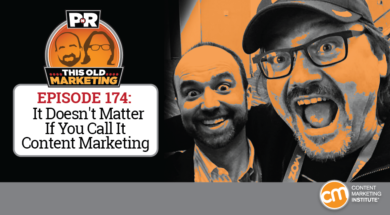PNR: This Old Marketing with Joe Pulizzi and Robert Rose can be found on both iTunes and Stitcher.
In this episode, Robert and I discuss why publishing agencies are struggling with the creative services business model. We also explore print’s potential for targeting teens and tweens, and give our views on some new video research. Our rants and raves cover a book on America’s “most dangerous huckster” and deconstruct a definition-centric content debate; then we close the show with an example of the week from Abbott Labs.
This week’s show
(Recorded live on March 13, 2017; Length: 1:04:21)
Download this week’s PNR This Old Marketing podcast.
If you enjoy our PNR podcasts, we would love if you would rate it, or post a review, on iTunes.
1. Notable news and upcoming trends
- Publishers face content studio growing pains (07:31): An article on Digiday describes some of the many pressures publishers are facing when trying to make their branded content studios profitable. Among the concerns the article raises are that publishers’ studios often aren’t adequately staffed, equipped, or structured to execute on campaigns at the scale that brands have come to expect. Robert and I slightly disagree in our views on this – while I see publishers struggling because they are still trying to straddle the line between creating editorial stories and selling branded content, Robert contends that the problem is that publishers need to offer strategy as part of their service – not just the creative.
Publishers need to offer strategy as part of their service not just creative. @robert_rose #ThisOldMarketing
Click To Tweet
- Teens and tweens are a print-hungry audience (20:21): In a Q&A interview posted on the Min magazine website, Bauer Media Group Editorial Director Brittany Galla talks about the benefits of print when it comes to connecting with passionate young readers. As a parent, I am encouraged by the opportunities discussed here, since I’m always pushing my own children to have a greater appreciation for the print medium. Robert concurs, and points out that the ubiquity of digital media consumption among teens and tweens right now emphasizes the unique value that print now represents as a differentiating medium.
- Research shows video is the new blogging (28:00): In a new post on his Convince & Convert blog, Jay Baer contends that we are entering a “no-read” era, as video content’s popularity continues to climb higher and higher. For example, according to a new benchmark report from Vidyard, businesses are creating approximately 18 videos a month – a cadence that Jay says is on par with many businesses’ blogging habits. While I can’t find fault with Jay’s overall assertions here, I do have concerns with two of the stats he cites, as they set marketers up to fall into a rut.
.@JayBaer says we are entering a “no read” era as video content’s popularity continues to rise.
Click To Tweet
13 Steps to Live Stream Video the Smart Way
2. Sponsor (34:30)
- Content Marketing Institute’s 2017 Events: Whether you are just getting started with content marketing or are looking to take your expertise to the next level, CMI’s portfolio of events has you covered. Enrollment for the current semester of Content Marketing University is open until March 31. We’ve launched an all-new program for 2017, but the spring session is limited to 500 learners, so don’t wait to secure your slot. Use the code PNR100 to get a $100 discount on registration. Time is also running out to sign up for our strategy-focused Intelligent Content Conference taking place on March 28–30 in Las Vegas. And don’t forget to send in your submissions for the Content Marketing Awards. The entry period runs from now until April 21, so don’t delay.
3. Rants and raves (37:15)
- Robert’s rave: The Native Advertising Institute’s Chad Pollitt just released a new post, which features an ambitious infographic that lists and categorizes all the players on the native advertising technology landscape – large and small. It’s a tremendously well researched and developed resource, and Robert recommends that anyone interested in this technology sector check it out.
How Does Native Advertising Fit in a Content Marketing Strategy?
- Robert’s rant: Plenty of listeners brought an article from The Drum to Robert’s attention this week – another in a long line of misinformed attempts to create controversy around whether or not content marketing exists. Robert is baffled at how a journalist who prides himself on the precision of his definitions could completely miss the point when it comes to accurately characterizing the discipline. But regardless of the semantics used, Robert stands by his position that using owned media to produce a result in an audience is different than promotional advertising.
Owned media to produce a result is different than promotional advertising, says @robert_rose. #ThisOldMarketing
Click To Tweet
- Joe’s rave: A friend recently recommended that I read the book Charlatan, by Pope Brock. It’s a fascinatingly true story of John R. Brinkley – a PT Barnum-esque snake oil salesman who rose to great wealth in an era of American history where the incompetent were encouraged to practice medicine, while the well-educated and elite were shunned. I think this brings to light an important idea: In a time where people are, once again, being expected to blindly buy into fallacies and faulty claims, there comes a tremendous opportunity for brands and publishers to build trust among those who desperately want something worth believing in.
Identity Matters: How Content Strategists Build Trust and Loyalty
4. This Old Marketing example of the week (53:50)
- Robert recently stumbled on a content marketing example that ranks among his all-time favorites. Pharmaceutical giant Abbott Laboratories got its start during an era of professional medical distrust similar to the one we just mentioned. Realizing that it needed to rehabilitate a deteriorating corporate image, the company brought on a new president, Simeon DeWitt Clough, who launched a publication called What’s New as a means of building relationships with doctors, hospitals, and other decision-makers in the medical community. Running from 1935 to 1945, the magazine served as a platform to showcase Abbott-funded art, in the hopes that the trust and admiration the company earned by contributing to intellectual and artistic pursuits would then extend to the thought leadership content Abbott published in pharmaceutical journals. What’s New’s oversized, photography-centric, format would later become the inspiration for Life Magazine; but it is Abbott’s model of using engaging content to circumvent a corrupt advertising machine that truly elevates this effort to the status of a This Old Marketing work of art.
For a full list of PNR archives, go to the main This Old Marketing page.
Cover image by Joseph Kalinowski/Content Marketing Institute
How do I subscribe?
The post This Week in Content Marketing: It Doesn’t Matter If You Call It Content Marketing appeared first on Content Marketing Institute.




No comments:
Post a Comment